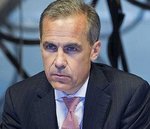Mark Carney, Governor of the Bank of England said on Thursday that he and his team are getting closer to considering raising interest rates. However, he made no mention of exactly when and repeated that decisions will depend on forthcoming economic data.
Mr. Carney also warned that complacency is threatening financial market stability. In search for greater returns, he says investors are pushing up asset prices and taking irrational risks. They are significantly increasing the likelihood of a “sharp reversal in asset prices.”
In a speech at the GIRO 2014 Conference (of general insurance actuaries) in Newport, Wales, Mr Carney pointed to the UK’s much improved economic outlook, falling unemployment and buoyant housing market.
Today, even the most pro-EU of Brits is relieved the UK decided to stay out of the Eurozone, which is likely sliding into a deflationary recession due to enormous differences in the economies of the northern and southern nations (that are forced to share the same currency).
Mr. Carney said the moment is getting closer at which interest rates will need to normalize. The current benchmark rate (0.5%) is at a 300-year low. Many economists wonder whether the Bank of England may have been stoking high inflation for years to come.
The BoE (Bank of England) is expected to raise rates early in 2015. However, there is growing talk in London of possibly a surprise move before the end of this year.
When rates do start to rise, they will do so gradually, Mr. Carney said.
MPC split likely to grow
In the last two meetings of the BoE’s Monetary Policy Committee (MPC), there was no unanimity in holding rates where there were, for the first time in over four years. The two members who voted for a rate rise are bound to be joined by others as fresh economic data come in.
The British economy is set to grow faster this year than any of the G7 nations – somewhere between 3.2% and 3.4%. Unemployment is currently at a 6-year low and continues to fall, and house prices are rising rapidly.
However, inflation is low, at 1.5% while wages are rising at less than half that rate, a sign that there is still some slack in the labor market.
When interest rates do start to increase they will do so gradually, Carney assured.
He also warned that some risks are still there:
“Headwinds facing the economy are likely to take some time to die down. Demand in our major export markets remains muted. Public balance sheet repair is ongoing. And a highly indebted private sector is likely to be particularly sensitive to changes in interest rates.”
Currency traders are betting on a relentlessly rising dollar for the rest of this year, with the pound sterling biting at its heels, with the other major currency falling back.


